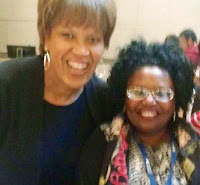By: Laurie Lynch, SHARE staff organizer
 |
| Holly St. Jean |
Holly
St. Jean is an amazing, hardworking, intelligent woman who is always willing to
go above and beyond to help those around her in every way she can. She is
cheerful, and, more often than not, smiling. We are all very lucky to have
Holly as part of our SHARE union; she has stepped up and volunteers to help her
co-workers by sitting as Secretary on our union's Executive Board. The Executive Board is the group of UMMS employees who serve as the governing body of the union. Members of
the Executive Board have many responsibilities, including helping to keep the
union strong by talking with and listening to members throughout UMMS,
negotiating contracts, advising and advocating for members with problems at
work, and addressing issues with management that have an impact on SHARE
members.
Holly is also brave and not scared to take a
risk, especially if it means the possibility of improving her life. She
recently moved on from a five-year position that she enjoyed at UMass' Worcester Recovery Center and
Hospital, Continuing
Care Units, as an Administrative Assistant for what she believes will be an opportunity to learn and advance in her career at UMass
in the department of Disability and Community Service as a Project Assistant II
located at South Street in Shrewsbury.
She also took what some might call a risk in love
when she signed up on the dating website, E-Harmony. She only met one man that
she was interested in, and went out on a few dates with him. However, she
nearly gave up on him after she lost touch with him for a couple of weeks. As
it turns out, he was away on a trip. He was devastated when he found out that
Holly was considering moving on. He was not going to let true love get away!
They continued to date for five years, and then married, just over two years
ago.
Holly grew up in Worcester with her three younger
brothers, and she felt she had a pretty typical childhood. However, others may
have found it challenging. Both of Holly's parents are deaf and communicate
using American Sign Language. Holly's mom was born deaf, and her father became
deaf shortly after his birth, due to an illness.
Mrs. St. Jean successfully achieved her high
school diploma from Burncoat High School and went on to obtain her Associates
Degree in Human Services from Quinsigamond College. Currently, she is working
on completing a bachelor's degree program at Worcester State College. One thing
is for sure, Holly has no plans on slowing down anytime soon!
25
random fun facts about Holly St. Jean:
- Favorite color – Purple
- Favorite season – Summer
- Beach or woods – Beach
- Chocolate or vanilla – Chocolate
- Dream vacation – Any tropical island
- Favorite style of music – Hip-hop, R&B, folk and rock
- Favorite food – Sushi
- If you could only eat one meal for the rest of your life, what would it be – Grilled salmon with roasted asparagus
- If you could go back in time, when would you go to, and why – Right after high school graduation, which is when Holly spent the most time with her beloved Grandmother.
- If you got stranded on a deserted island, with no power source, what five items would you bring – Husband, book, 3 guinea pigs, sunblock and flip flops
- Do you blow dry your hair, or just let it dry on its own, or towel dry – Blow dry
- Do you untie your shoes when you take them off – No
- Favorite book – Any book by Jodi Picoult
- Last thing you bought (not including food) – Green sweater (Wearing it today, very pretty.)
- Do you have any pets – 3 guinea pigs: Paco, Larry, and Buddy
- Favorite day of the week – Saturday
- T.V. show you secretly enjoy – Keeping up with the Kardashians
- Favorite potato chip flavor – Salt and vinegar
- Favorite hobbies – Shopping for clothes and playing video games
- Do you play a musical instrument – No, but wishes she could
- What's your worst pet peeve – People who complain but do nothing about it
- Who named you and why – Paternal Grandmother; she rubbed her mother’s belly and said, “My little Holly Ann.”
- What languages do you speak – American Sign Language, English and very little Spanish
- Any nicknames - Hol
- Do you have a favorite life motto – “Be Yourself.”


